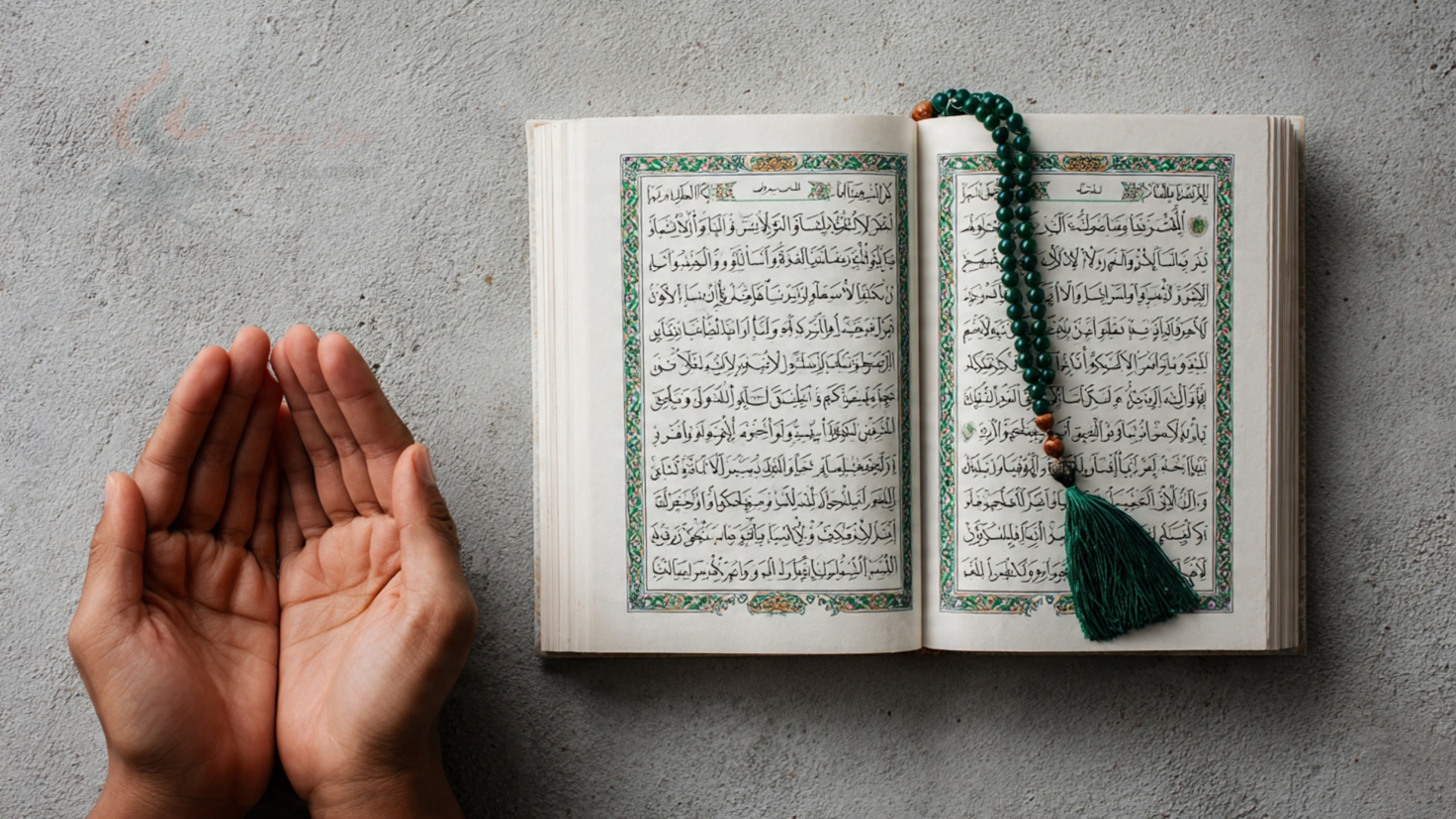The Astaghfar- The Fifth Kalima is a necessary supplication within the Islamic religion and is a prayer to Allah pleading to forgive one. Through it, the believers declare their mistaken promise and request forgiveness of sins they commit either with recognition or unconsciously, deliberately, or without deliberation. This short, but powerful Kalima reinforces the believer, promotes humility, and reinstigates the connection of the Muslim with Allah and provides a medium to purify the heart and soul.
Analysts and scholars point out Astaghfar as an imperative spiritual activity in the Islamic religion. Studies in Islamic theology focus on the psyche and emotional advantages of elevating feelings of guilt and creating inner tranquility. Research also shows that through regular repentance in the form of Astaghfar, one develops oneself as well as an intimate relationship with god. Numerous verses of the Quran and Ahadith underline that forgiveness of Allah is endless provided that his will is sincere repentance; therefore, this Kalima is the core value of Islamic beliefs.
Just imagine that instead of regrets, you may make spiritual renewal. The promise of God that the mercy of Allah is greater than everything, Astaghfar turns out not to be merely a recitation; it is a way of life. The recancies are compared to every closer step towards solace, peace, and guidance. Are you in need of forgiveness or spiritual enlightenment? Then the Fifth Kcalima is going to be the key to regaining a pure and calm heart. What are you waiting for to start this strongly effective practice?
Arabic Text and Its Meaning of the Fifth Kalima
Kalima Astaghfar is deep in meaning in its Arabic text. It is a humble pleading mix with a cry of mercy. Knowing all the words will enable the believers to say it from the heart.
Arabic Text:
اَسْتَغْفِرُ اللهِ رَبِّىْ مِنْ كُلِِّ ذَنْۢبٍ اَذْنَبْتُهٗ عَمَدًا اَوْ خَطَا ًٔ سِرًّا اَوْ عَلَانِيَةً وَّاَتُوْبُ اِلَيْهِ مِنَ الذَّنْۢبِ الَّذِیْٓ اَعْلَمُ وَ مِنَ الذَّنْۢبِ الَّذِىْ لَآ اَعْلَمُ اِنَّكَ اَنْتَ عَلَّامُ الْغُيُوْبِ وَ سَتَّارُ الْعُيُوْبِ و َغَفَّارُ الذُّنُوْبِ وَ لَا حَوْلَ وَلَا قُوَّةَ اِلَّا بِاللهِ الْعَلِىِِّ الْعَظِيْمِؕ
Transliteration:
Astaghfirullah Rabbi Min Kulli Dhambin Adhnabtuhoo ‘Amadan Aw Khata-an Sirran Aw ‘Alaaniyata-wn Wa-atoobu Ilaihi Min-adh Dhambi-l Ladhee A’lamu Wamina-dh Dhambi-l Ladhi Laaa A’lamu Innaka Anta ‘Allaamu-l Ghuyoobi Wasattaaru-l ‘Uyoobi Wa Ghaffaaru-dh Dhunubi Walaa Hawla Walaa Quwwata Illaa Billaahi-l ‘Aliyyil ‘Azeem.
English Translation:
“I seek forgiveness from Allah, my Lord, from every sin I committed knowingly or unknowingly, secretly or openly, and I turn towards Him from the sin that I know and from the sin that I do not know. Certainly, you are the Knower of the hidden things, the Concealer of mistakes, and the Forgiver of sins. And there is no power and no strength except from Allah, the Most High, the Most Great.”
Urdu Translation
“میں اللہ سے معافی مانگتا ہوں، جو میرا رب ہے، ہر گناہ کے لیے جو میں نے جان بوجھ کر یا انجانے میں، چھپ کر یا ظاہر طور پر کیا، اور میں اس کی طرف رجوع کرتا ہوں ان گناہوں سے جنہیں میں جانتا ہوں اور ان گناہوں سے جنہیں میں نہیں جانتا۔ بے شک، آپ پوشیدہ چیزوں کے جاننے والے، عیبوں کو چھپانے والے، اور گناہوں کو معاف کرنے والے ہیں۔ اور کوئی طاقت اور قوت نہیں سوائے اللہ کے، جو سب سے بلند اور سب سے عظیم ہے۔”

Importance and Spiritual Value of the Fifth Kalima
The Astaghfar is a spiritual therapeutic honey that heals spiritual injuries. It is not by words only, but a step toward self-improvement by repentance. The believers are continually instructed in the Quran to turn to Allah when they feel guilty or when they know they have done something wrong. The recitation of the Fifth Kalima indicates a sign of humility and the urge to move back into the beliefs of Islam.
This Kalima is also related to the Islamic meaning of Tawbah (repentance). It guarantees that forgiveness is always within reach in case an individual is genuinely seeking the same. Sins, no matter how serious, are stepping stones to personal development when joined with repentance.
Quranic Verses on Forgiveness
Many times, the Quran urges us to repent. The following are a couple of examples to illustrate its importance. The 286th verse of Surah Al-Baqara: “Our Lord, pardon us and forgive us! Destroy not, have mercy on us. You are the Defender of ours..
Surah Al-Zumar (39:53): Say, (O Muhammad): O My servants who have transgressed against themselves (by committing evil deeds and sins)! Desist not in hoping the mercy of Allah, verily He forgives all sins. Truly, He is Oft-Forgiving, Most Merciful. The Fifth Kalima is a systematic manner to internalize these messages when one is praying individually.
The Benefits of Astaghfar (Seeking Forgiveness) to the soul
This is far more than some kind of spiritual workout. It promotes psychological and emotional health actively. Forgiveness allows abatement of guilt and remorse and makes people obtain mental comfort.
A Clean Slate
Each time Astaghfar is uttered by a believer, it cleanses sins. This is equivalent to a clean slate, giving a chance to move up spiritually without the luggage of past errors.
Reduced Mental Stress
Guilt can be a burden to the mind. Dealing with errors by repenting reduces the emotional load a lot. It is an effective method of reducing the anxiety connected to the previous choices.
Improved Relationship with Allah
This constant recitation develops a changing relationship with Allah. It forms communication that is founded on truth and introspection. This is a step that would turn the spiritual life of a believer and harden his/her commitment daily. Transitioning to the next topic brings us to a holistic understanding of the Six Kalimas of Islam.
A Comprehensive Overview of the Six Kalimas
First Kalima (Tayyab)
The Laa Ilaaha Illa-llaahu Muhammadur-Rasoolu-llaah is a phrase of declaring the oneness of Allah and including Muhammad (PBUH) as his messenger. It is a representation of the origin of the Islamic faith.
Second Kalima (Shahadat)
Ash-hadu Al-laaa Ilaaha Illa-llah…” The spirit is deep and weighty in testifying to one God in the oneness of Allah, along with accepting the prophethood of Muhammad (PBUH).
Third Kalima (Tamjeed)
This Kalima is about the praise of Allah. Each word shows the greatness of Allah and the aspect of gratitude.
Fourth Kalima (Touheed)
This recitation puts emphasis on the sovereignty of Allah. It also reminds them of His supreme power, which continuously boosts their faith.
The Fifth Kalima (Astaghfar)
This Kalima is about sin and the intention to better oneself.
Sixth Kalima (Radd-e-Kaida)
Kalima rejects disbelief. It urges the faithful to be strong as relates of anything that is against Islam.
Difference Between the Fifth Kalima and Other Kalmay
Unlike other Kalimas, the Fifth Kalima only talks about repentance. Whereas the First and Second Kalimas proclaim belief, the Fourth one stresses the oneness of Allah, and the Fifth Kalima leads to an intimate form of penitence. This specific motive keeps believers tethered to Tawbah.
Steps to Incorporate Astaghfar into Your Daily Life
The simplicity of the Fifth Kalima makes this beauty one. These are some practical ways to turn it into a habit:
Morning and Evening Routine
Memorize Astaghfar and do it at the beginning and the end of every day. It gives the soul to concentrate on the faith.
During Salah
Add it at the end of every prayer. It renders the idea of repentance a part of habitual worship.
Journaling Reflection
Write your ideas about the intention of improving yourself. Combine this with recitations in the name of spiritual accountability.
Use a Tasbeeh
A Tasbeeh would keep the record of the number of times you say Astaghfar neatly. It makes its message strong in your heart through repetition.
Why Learning the Kalmas Strengthens Faith
Both support Islamic values in an easy-to-remember format. On devoting a certain amount of time to recitation and learning, believers become more attached to their religion. The Kalimas give sense, shift the state of turmoil to peace, and allow personal spiritual growth.
Conclusion
The fifth Kalima talks about the might of forgiveness. It acts as a guiding star, so that each of the believers can come back to the grace of Allah irrespective of his/her past. Its lyrics contain true wisdom, asking people to be responsible for their actions. To read Astaghfar is bravery. It provides inner transformation by converting mistakes to spiritual strength.
Well, in the end, the Fifth Kalima is not merely a request. It is a trace of the mercy of Allah and the possibility of bettering humanity. Incorporating it into everyday life will improve the psychiatric state and increase faith. As long as you are where you are, you should always know that Allah’s forgiveness is just around the corner. The initial step you must take is to repeat the words of Astaghfar today.




